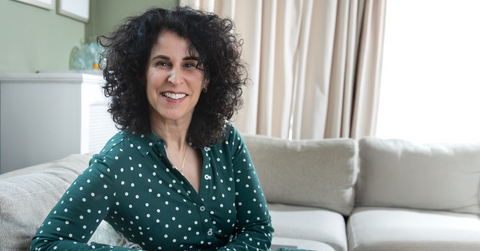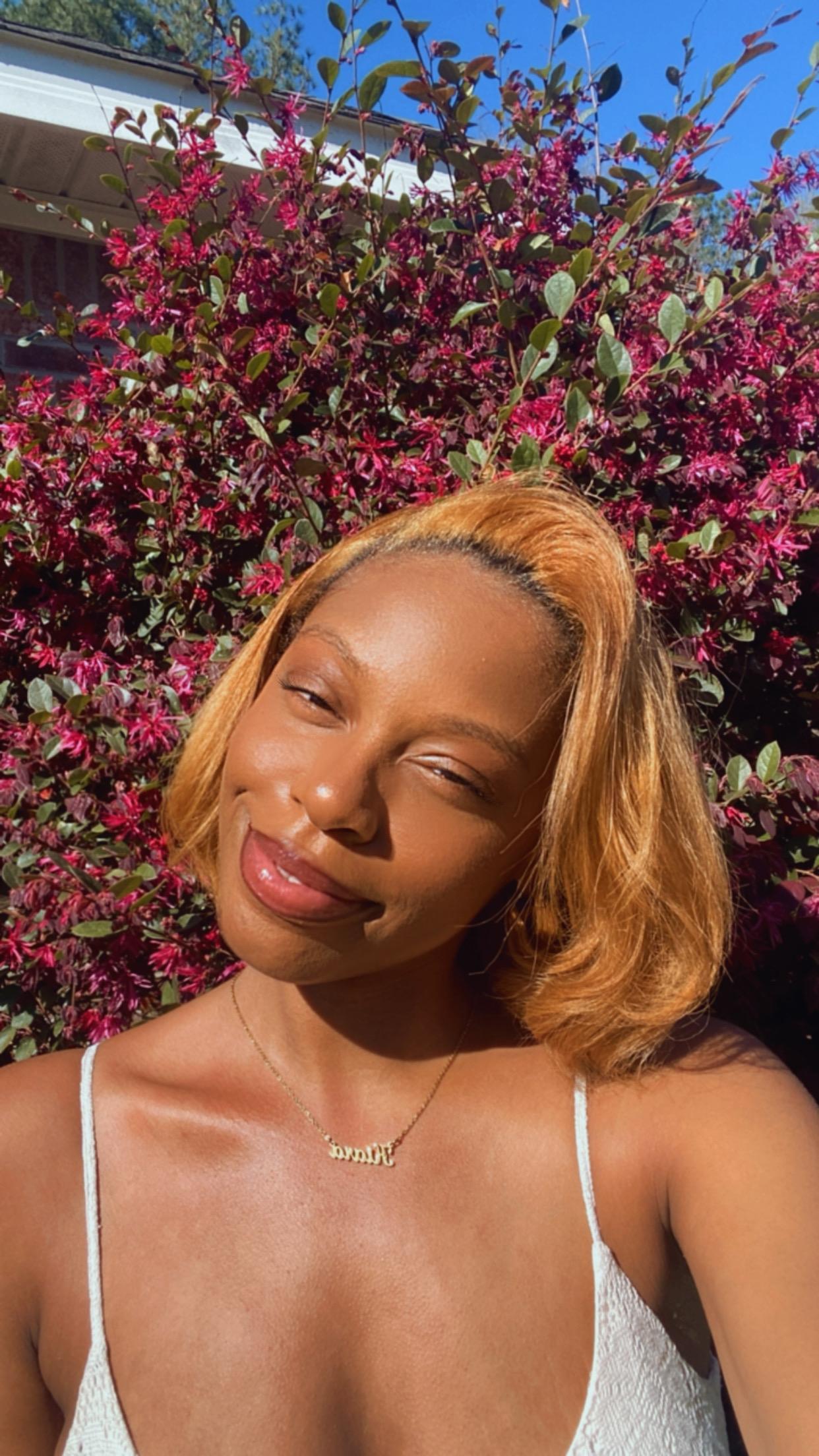Poet and Yale University Lecturer Richard Deming describes his colleague and award-winning New York Times Magazine staff writer Susan Dominus as “one of the finest journalists working today.” Susan joined the Times as a Metro Columnist in 2007, tackling topics in journalism that deal with gender issues, women’s health, and family dynamics. Her impactful reporting has led Susan to write powerful stories on major cultural shifts, one of her biggest accomplishments being that she worked on the 2018 team that won a Pulitzer Prize for their reporting on workplace sexual harassment issues. This reporting was a part of a larger effort that addressed the #MeToo movement, which helped individuals come forward about powerful figures who have committed sexual misconduct.
Her 2023 cover story, “Women Have Been Misled about Menopause,” focuses on the argument that women suffering from menopausal symptoms are often overlooked due to outdated research and a lack of concern. This story sparked widespread discussion regarding women’s health and earned Susan a National Magazine Award in 2024.
In 2022, Susan added educator to her resume and began lecturing at her alma mater, Yale University, teaching the next generation of reporters how to use their voice and go out to hunt for stories.
Her latest achievement encouraged her to explore her longstanding curiosity about the nature of family and superachieving siblings. She penned her first novel, ‘The Family Dynamic: A Journey into the Mystery of Sibling Success.’
Susan’s longevity can be credited to her approaching every article she writes with a curious and open mind. Her ability to be empathetic while still being transparent with the facts is the core of her journalistic ethics, which she strongly adheres to.
Her Agenda spoke with The New York Times writer about her journey as a journalist, her accomplishments, and what it’s like guiding the future of reporters.
Her Agenda: Tell me about your journey as a journalist and what made you choose this path.
Susan Dominus: I’ve always been one of those kids whose best friends were books. It was always so obvious to me that I wanted to be part of the world of writing, and I thought I would be a fiction writer because that’s my first love, reading fiction. However, it turns out I have no imagination. In college, I worked up my nerve to get involved in a student magazine. That perfectly suits my personality because I had the pleasure of writing, which I love. Still, I’m also a naturally very curious person, and to have permission from the role of journalist to ask all the questions I’d want to be asking anyway felt like a natural fit for me.
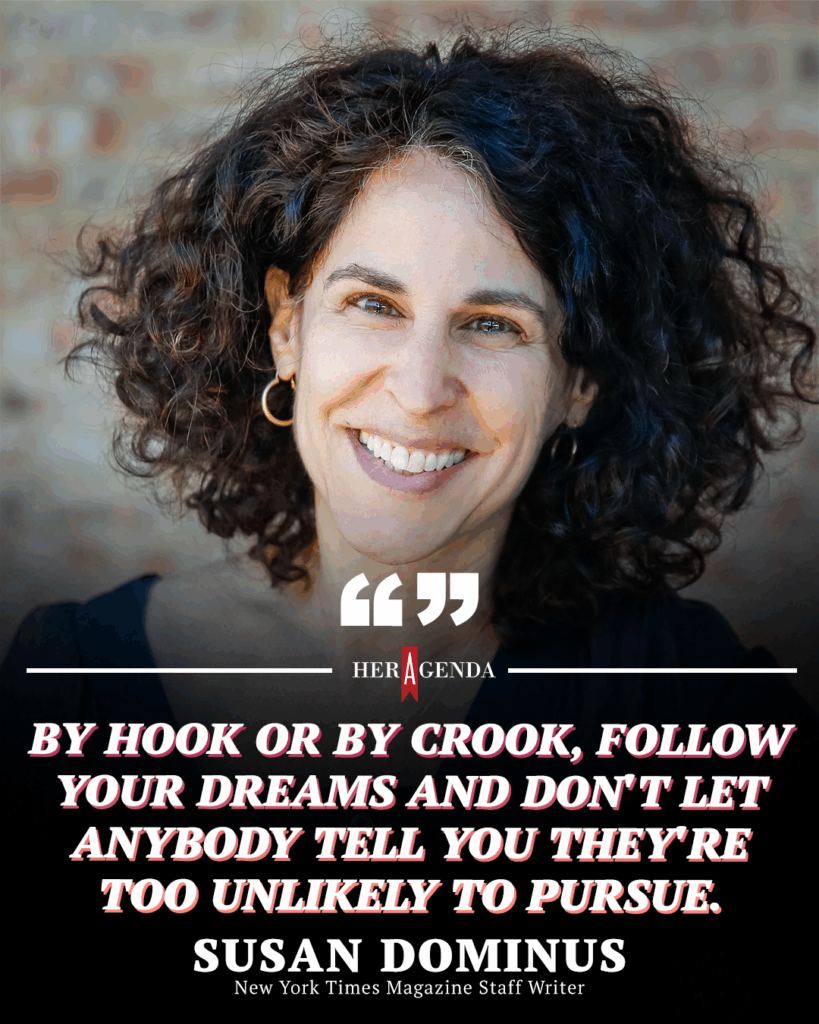
Her Agenda: What led you to work at the New York Times, and how has that impacted your life?
Susan Dominus: When I started in publishing, I had a mentor who said to me, If you want to be a writer, be an editor first, because you will make friends with the people who are in a position to assign you pieces, and they will know you and trust you if you do a good job as their colleague. I followed her advice, and I have to say it is exactly how it played out. I was an editor until I was 30. When I started freelancing, I did have friends and colleagues who were eager to assign me work because they knew I was professional and they knew I understood how things worked. They’d see me rewrite stories from top to bottom. I don’t think it was just cronyism. I think it was an assurance that I would not leave them high and dry. I would get things in on deadline in reasonable shape. I’d been freelancing for the magazine for some time when, eventually, they were looking to hire a columnist for the Metro section, and that was how I became an employee of the New York Times. I would say that the best thing about the New York Times is the access it gives you to incredible colleagues. To be part of an institution that big, packed with that many talented, generous, ethical, hardworking people, has been a joy.
Her Agenda: What is your approach when you’re starting a new piece?
Susan Dominus: I try to go in very open-minded. People sometimes ask me: What is your angle? I usually say if I had an angle, I wouldn’t be asking these questions. You read as much as you can about the topic before you head in. Then I think you just know, depending on the kind of article it is. You either approach it head-on or you circle your way in. There are many different ways to approach an article depending on the genesis, the goal, and how people will feel about it when it’s done.
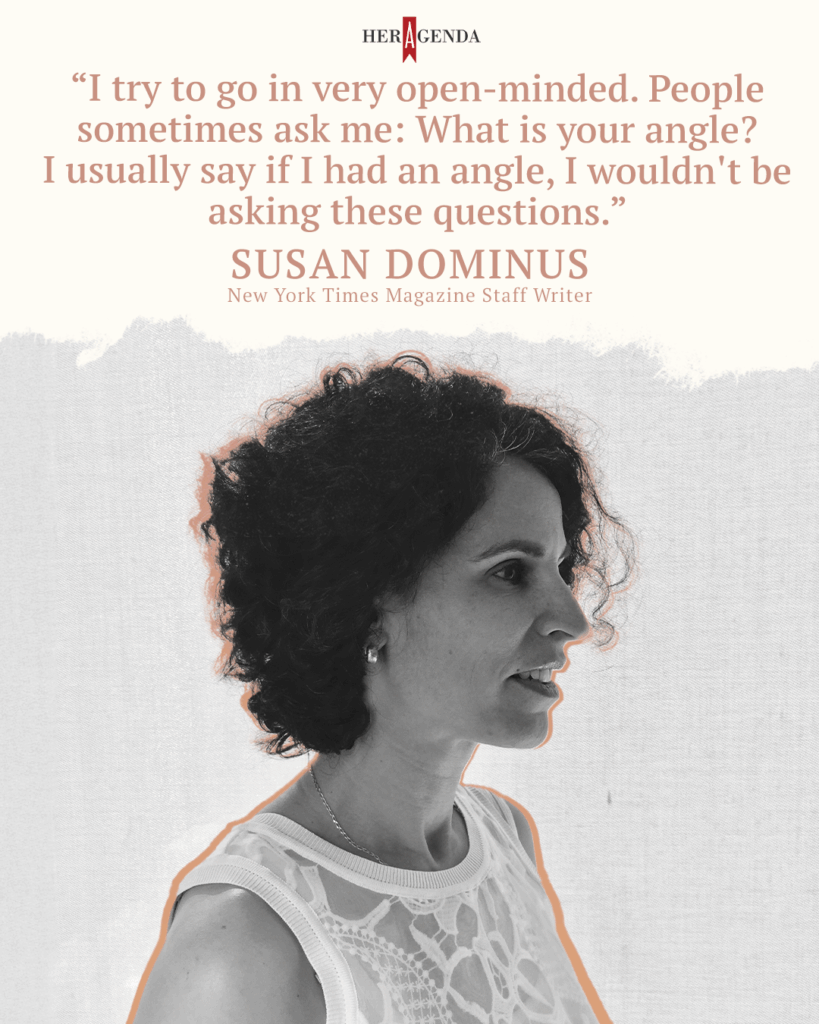
Her Agenda: What is the most fulfilling piece of journalism you’ve ever written?
Susan Dominus: It was a tremendous privilege to be part of the team that continued reporting on sexual harassment in the workplace after Jodi Kantor and Megan Twohey broke the news of Harvey Weinstein’s ongoing harassment and abuse of women. The team of people was so incredible, and I learned so much from them, but also felt like a small part of a history-making and culture-changing moment. I do emphasize a small part, but that was extremely gratifying. Also, my real devotion at the New York Times is to the New York Times Magazine. A cover story I wrote about menopause that went fairly viral has also been very gratifying because so many women have told me that it was helpful to them. Many doctors have told me that it helped change the conversation around menopausal hormone therapy. Fewer women feel they have to suffer for years and years rather than get the treatment that they need.
Her Agenda: What type of pieces do you gravitate towards?
Susan Dominus: One of the things I have found is that no matter what the assignment is that I’m given, I tend to be very interested in family dynamics in that story. If I’m writing a piece about longevity, it ends up being a piece about how family life has shifted when people who are the matriarchs or the patriarchs of the family are still in a position to make decisions and have some control when they’re like 100 years old. If I’m writing about young girls returning to school in Afghanistan after the fall of the Taliban, and it ends up being a story about an Afghan family of daughters and how they all interact together. It’s this basic unit of our stories, and it’s probably why the first and only book I’ve written is called ‘The Family Dynamic.’ I’m fascinated by how families shape our lives.
Her Agenda: What led you to write ‘The Family Dynamic’ and what is it about?
Susan Dominus: It’s a book that is comprised of six almost nonfiction novella-like chapters about six different families with very high-achieving siblings. Those chapters alternate with social science about psychology and developmental psychology, genetics, and the nature of research. It combined two things that we’re all kind of interested in, which are the nature of success and the nature of family. I, as a kid, always wondered about those families where so many siblings achieved and wondered whether there was some message they were getting at home or some kind of empowerment that they were getting. It was when I started digging into the research that I realized that the sibling component was quite powerful in these families. That became a whole area of research that has been understudied, and that I was very happy to tackle in my book.
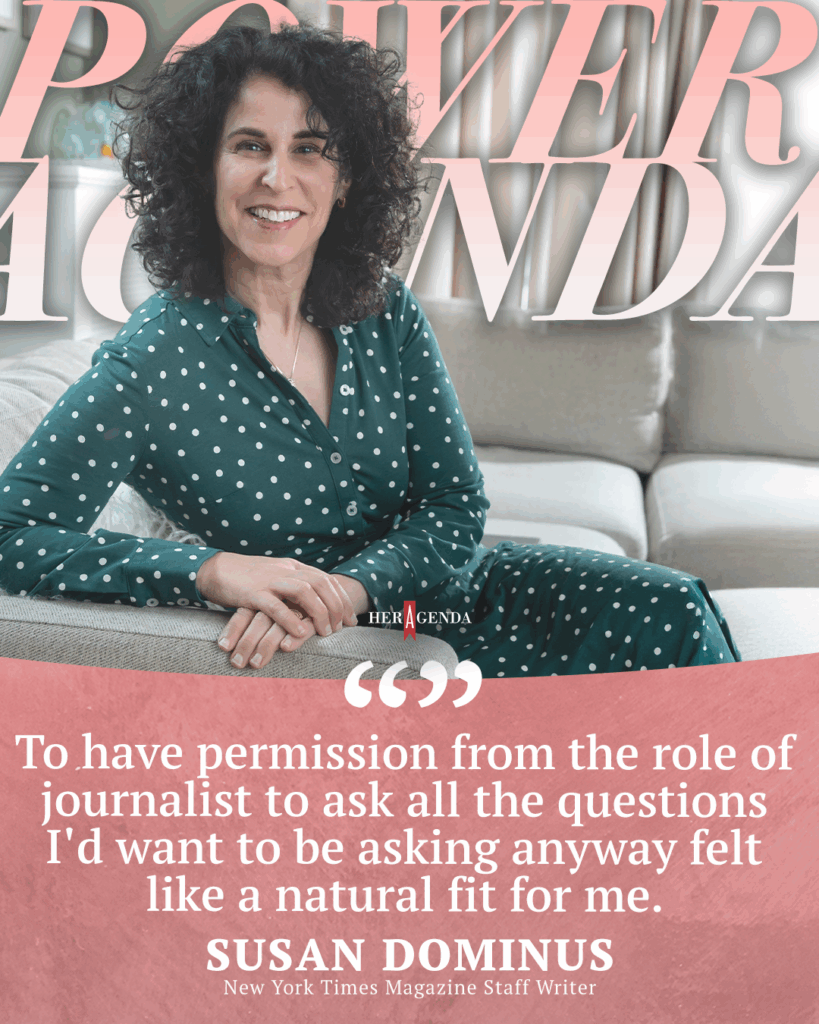
Her Agenda: What is it like switching from journalist to author in terms of the writing process?
Susan Dominus: You’re just holding so many more ideas in your head. Sometimes I would step away from the book for a month or two because I was very busy with another assignment. I would probably spend another month avoiding the book because I knew it was going to take me so long to be able to master all the material that I had already reported or started to write. Writing a book is juggling a huge amount of information. In the case of this book, I was weaving various themes throughout the chapters. I was weaving… stories of the Bronte family, [who are] the ultimate high-achieving family throughout. I was calling on social science. So it was holding it all together, so you can make the structure work. It’s harder the longer it is.
Her Agenda: Who is someone who has been a mentor to you in your career, and why?
Susan Dominus: I have many, and many of them I’m lucky enough to call my closest friends. There are my editors, Elena Silverman and Rachel Poser, who give me incredibly thoughtful advice about my work, and in the case of Elena, who I’ve just known so much longer in my life. I also have friends like Jodi Rudoran and Jennifer Senior, and Ariel Kaminer, who are brilliant thinkers and amazing sounding boards, and Jodi Kantor as well. They are not officially mentors, but they’re like a team of consigliere that I feel very lucky that I can call upon.
Her Agenda: You’re a lecturer at Yale. What have you learned about teaching the next generation?
Susan Dominus: I mean, what thrills me about my students is that they get it. They get the desire for integrity and fairness, and independence. They are hungry. They make me feel great about the future of journalism. They’ll find a way to get their work into the world. I feel confident. Some of them are incredibly gifted writers, and some of them are incredibly gifted reporters. Some of them are both. I feel like journalism is in good hands. I see my job at Yale as much as being a recruiter as it is being a teacher. I want kids to learn to do the job as long as they can. I also feel it’s my job to get them excited about journalism and all that it can be and all that it can do, and for them to see what they’re capable of. To watch them improve draft after draft has been very rewarding.
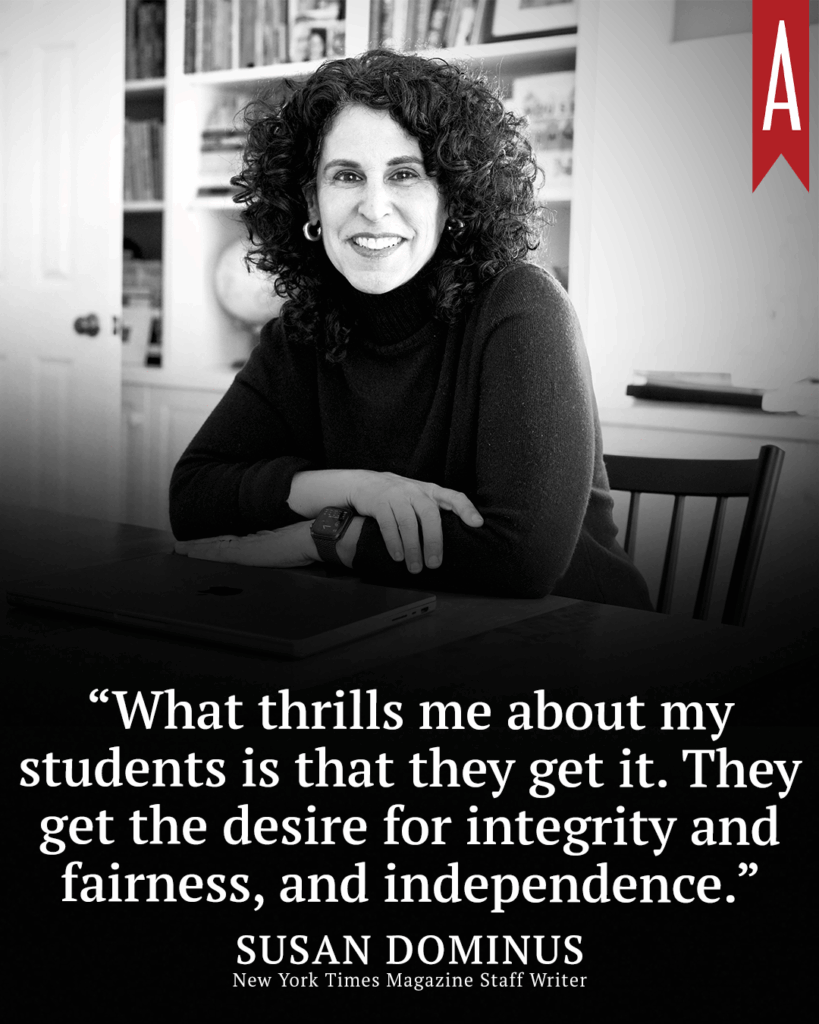
Her Agenda: When you’re writing a story, do you know that you have something impactful or that can change someone’s viewpoint?
Susan Dominus: Well, first of all, you don’t even know that’s the funny thing. Sometimes you think a story is going to rock everyone’s world, and then there’s some big news announcement that happens that day, or some other hugely influential article publishes simultaneously. There are all kinds of reasons why really good journalism sometimes doesn’t have the impact that you think it’s going to. It’s also almost inconceivable to imagine that your work will have the impact that, for example, the menopause piece did. I didn’t think in my wildest dreams the piece was going to have so many women talking and circulating it, and engaging in it. I don’t have the kind of ego that lets me imagine. You hope that whatever you do will have an impact, but you don’t ever really think it’s going to.
Her Agenda: What piece of advice would you give to young girls who dream of just making it in the journalism world?
Susan Dominus: If you find a question that needs answering and you get an answer, [there] will always be an audience for your work. Don’t let people tell you it’s too hard. If you’re a young woman and you want to be a journalist, you can always give up if you want to, but there’s no reason to give up before you try. You’re young, you don’t have a mortgage, you’re not putting your kids through college. By hook or by crook, follow your dreams and don’t let anybody tell you they’re too unlikely to pursue.
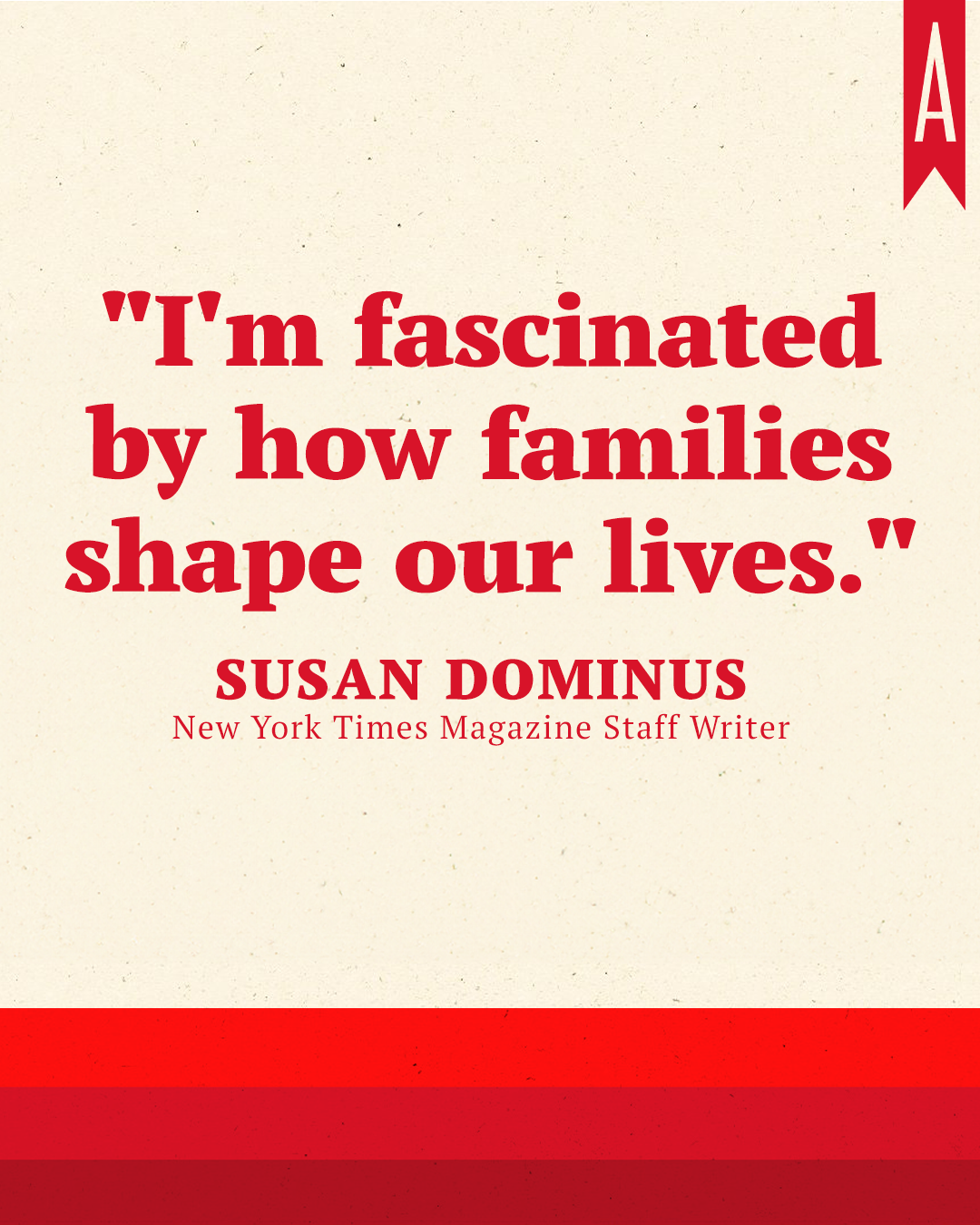
[Editor’s note: This interview has been edited for length and clarity.]

